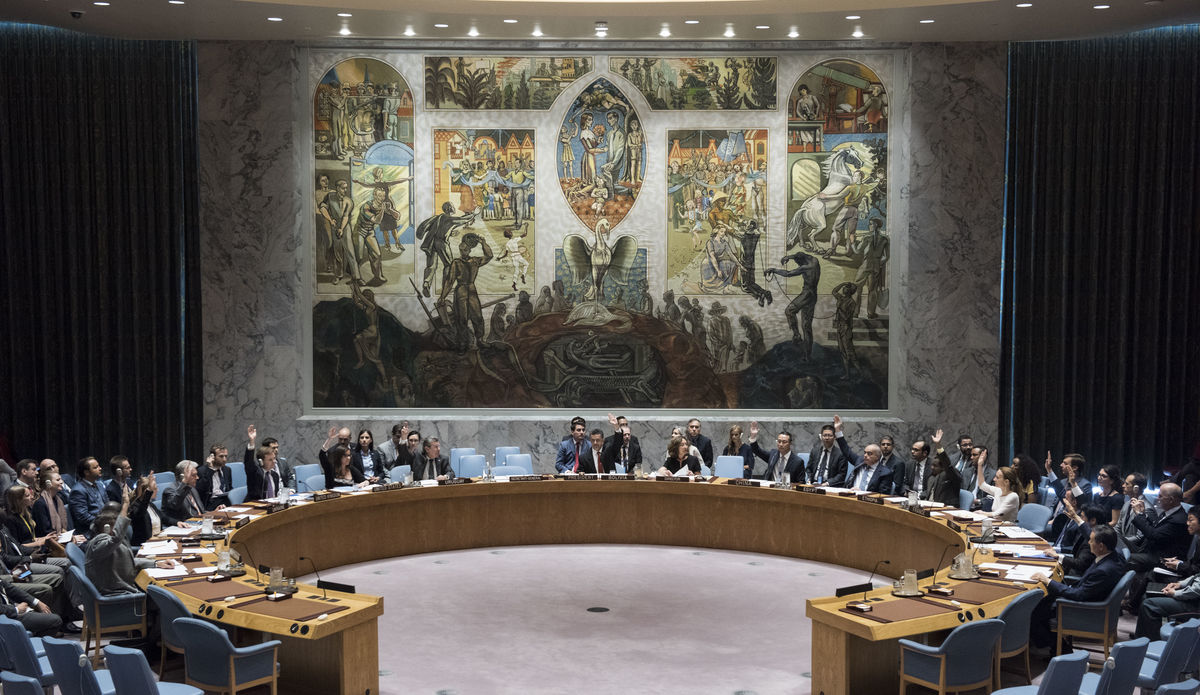Qatar is due to present its argument on February 23 before the Hague on the legal consequences of Israel’s occupation of the West Bank, East Jerusalem and Gaza.
Qatar has expressed its “deep regret” over the blocking of Algeria’s United Nations Security Council draft resolution which called for an immediate ceasefire in Gaza on Tuesday, highlighting international double standards towards the war on the Strip.
“Qatar expresses its deep regret at the impediment of a draft resolution submitted by the brotherly People’s Democratic Republic of Algeria to the Security Council, on behalf of the Arab Group, demanding an immediate ceasefire in Gaza Strip,” the Qatari foreign ministry said in a statement on Wednesday.
The United States used its veto power at the UNSC for the third time since the start of the war on October 7, to block a ceasefire resolution in Gaza, as the genocide nears five months.
Israel has killed more than 29,000 Palestinians, mostly women and children, in Gaza while forcibly displacing more than 80 percent of the population.
Algeria presented the draft resolution on behalf of Arab nations on Tuesday that received the majority vote of 13 out of 15 UNSC members in favour of it.
Washington, Tel Aviv’s staunchest ally, was the only country to vote against the draft as the United Kingdom abstained.
UNSC resolutions require at least nine votes in favour without any vetoes by the five permanent members, which include the U.S., UK, France, Russia, and China.
Washington’s envoy to the UN Linda Thomas-Greenfield, justified her use of the veto power by saying she had concerns over the resolution affecting ongoing mediation talks between Qatar, the U.S., Egypt, and Israel.
In its statement, Qatar’s foreign ministry stressed that “the ongoing brutal aggression on Gaza exposes time after time the double standards and the differing positions of the international community regarding the systematic war crimes practised by the Israeli occupation.”
“It also exposes its indifference to the tragic humanitarian situation in the Strip. The Ministry stresses that the State of Qatar will continue its efforts in cooperation with regional and international partners to reach an immediate ceasefire, protect civilians, and facilitate the unhindered entry of humanitarian aid to all areas of the Strip,” the statement added.
Algeria described the draft resolution as “a stance for truth and humanity” while stressing that “voting against it implies an endorsement of the brutal violence and collective punishment inflicted upon” Palestinians.
Algeria is among the most vocal and staunch supporters of the Palestinian cause. One of the reasons behind the deep-rooted solidarity comes from Algeria’s 132 years of French occupation between 1830 and 1962.
The Palestinian Presidency also condemned the U.S. vote against the draft resolution on Tuesday, saying it was surprised “at the continued American refusal to stop the genocidal war” against Palestinians.
Riyad Mansour, Palestine’s permanent observer at the UN, stressed that the veto is “absolutely reckless and dangerous.”
“It has been nearly three weeks since I last addressed the Council following the Court’s order, appealing for action to be taken to ensure the implementation of the provisional measures and ensure a ceasefire that would protect the Palestinian people and avert further ravaging of their lives by the Israeli onslaught,” he said, referring to the International Court of Justice’s provisional measures of January 26.
The ICJ’s interim ruling at the time was in response to South Africa’s case accusing Israel of committing genocide in Gaza, which it had submitted on December 29, 2023.
South Africa’s claim pointed to Israel’s violation of the 1948 Convention on the Prevention and Punishment of the Crime of Genocide, though the court fell short of ordering a ceasefire in Gaza.
An overwhelming majority of 17 judges voted for six emergency measures that Israel must implement in Gaza, including the prevention of incitement to commit genocide and allowing more humanitarian aid.
However, Israel has continued its genocidal war in Gaza with dangerous plans to advance into Rafah, where more than one million displaced Palestinians have been crammed up.
Starvation in the isolated northern part has been on the rise with aid barely reaching the rest of the population.
Meanwhile on Monday, the UN called for an investigation into reports pointing to violations against Palestinian women and girls in the Gaza Strip and the West Bank by Israel.
“We are particularly distressed by reports that Palestinian women and girls in detention have also been subjected to multiple forms of sexual assault, such as being stripped naked and searched by male Israeli army officers. At least two female Palestinian detainees were reportedly raped while others were reportedly threatened with rape and sexual violence,” the experts told the UN.
Since Monday, the Hague has listened to arguments by 52 countries on the legal consequences of Israel’s occupation of the West Bank, East Jerusalem and Gaza.
Qatar is due to present its argument on February 23 along with the United Kingdom, Namibia, Norway, Oman, Pakistan, Indonesia, Slovenia, Sudan, Switzerland, Syria, and Tunisia.
The case is separate from the one that South Africa had raised last year.
The ICJ’s decision to move forward with the proceedings came after the UN General Assembly adopted a resolution on December 30, 2022, seeking the court’s opinion on the legality of Israel’s occupation of Palestine.
Qatar was among the majority of 98 countries that voted in favour of the resolution. A total of 24 other countries, including Israel’s main ally the U.S., had voted against the resolution, as 53 members abstained.







